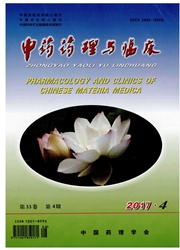

 中文摘要:
中文摘要:
目的:维生素D受体(VDR)信号通路在肿瘤的防治中起有重要作用,研究牡蛎对结肠肿瘤细胞增殖、侵袭、转化的影响,从VDR信号通路阐明牡蛎抗癌的机制。方法:制备牡蛎酶解产物,用Aqueous法研究牡蛎对SW480结肠癌细胞体外增殖的影响;用细胞Transwell侵袭试验研究牡蛎对SW480细胞侵袭的影响;用软琼脂克隆形成试验研究牡蛎对SW480细胞转化的影响;用qRT-PCR研究牡蛎对SW480细胞中癌基因c-Myc和cyclin D1表达的影响,以及对VDR信号通路基因VDR和E-cadherin转录的影响。结果:终浓度为100μg/ml、200μg/ml和400μg/ml的牡蛎酶解产物可以剂量依赖性地抑制SW480结肠癌细胞体外增殖、侵袭、转化,下调SW480细胞中c-Myc和cyclin D1 mRNA水平,抑制VDR和E-cadherin转录表达。结论:牡蛎具有良好的抗肠道肿瘤作用,其机制在于增强VDR信号通路的活性。
 英文摘要:
英文摘要:
Objective: Vitamin D receptor( VDR) signaling pathway plays a vital role in the prevention and medication of cancer. The effects of Pacific oyster Crassostrea gigas( CG) on the proliferation,invasion,transformation of colonic cancer cells were investigated,and the mechanism underpinning the anti-cancer property of CG through VDR signaling pathway was illuminated. Methods: Following preparation of the enzymatic hydrolysate from CG,the effect of CG on the proliferation of colonic cancer cells SW480 was determined with Aqueous method. The influence of CG on the invasion of SW480 cells were evaluated using Transwell invasion assay. The function of CG on the transformation of SW480 cells was assessed by soft agar colony formation assay. The effects of CG on the expressions of oncogenes including c-Myc and cyclin D1 in SW480 cells and the transcriptions of VDR and E-cadherin involved in VDR signaling pathway were detected with quantitative real-time RT-PCR. Results: Crassostrea gigas hydrolysate at final concentrations of 100 μg / ml,200 μg / ml and 400 μg / ml dose-dependently inhibited the proliferation,invasion and transformation of colonic cancer cells SW480 in vitro. CG also down regulated the levels of c-Myc and cyclin D1 mRNA and suppressed the transcription expression of VDR and E-cadherin in SW480 cells. Conclusions: CG exerts anti-intestinal cancer property by heightening the activity of VDR signaling pathway.
 同期刊论文项目
同期刊论文项目
 同项目期刊论文
同项目期刊论文
 期刊信息
期刊信息
